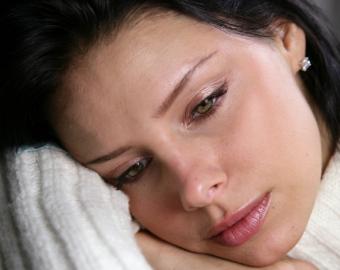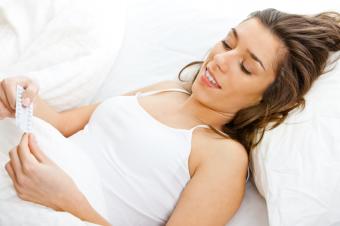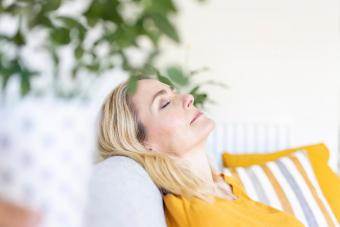Premenstrual Insomnia

Premenstrual insomnia affects your ability to sleep and the quality of the sleep you do manage. Studies suggest that women who suffer from premenstrual insomnia may suffer sleep problems throughout the month. It is important to identify the symptoms of this type of insomnia so you can seek out care.
Lack of Sleep

Premenstrual insomnia may be related to anxiety, irritability, depression and physical pain. Cramps are a typical symptom of premenstrual syndrome. Painful cramps can make getting comfortable difficult.
Symptoms of Anxiety

Daily worries and anxiety can accumulate, adding to the difficulties with sleep. Insomnia can be cyclical in nature. Anxiety keeps you awake. Anxiety over being unable to sleep reduces your ability to go to sleep. Persistent insomnia throughout the month may be a symptom of other problems.
Food Cravings

Food cravings are another typical premenstrual symptom that can affect your sleep. High carbohydrate foods and high sugar content can keep you awake, particularly if eaten late at night.
Sleep Journal

Doctors recommend keeping a sleep journal if you suspect premenstrual insomnia. The body typically enters REM once every 90 minutes, but during ovulation and menstruation, a woman's body temperature spikes and may shorten the sleep cycle to 60 minutes leaving her to feel fatigued and cranky.
See a Physician

If you or someone you know, suspects that she is suffering from premenstrual insomnia, make an appointment with your physician to address your options. Your doctor can recommend a sleep study if they feel it is necessary or prescribe a sleeping pill to help you sleep on those few nights a month as well as help you explore other options.
Medical Intervention

In addition to sleeping pills, oral contraceptives can help with premenstrual insomnia by reducing your body's physical effects from menstruation and ovulation. You should be in good health otherwise, not smoke and not suffer from other conditions or be affected by other medications before considering the pill. If you are under other medications, they may be reacting to the flood of progesterone during ovulation and contributing to your sleeplessness. Be sure to discuss all your medications with your physician.
Avoid Sleep Struggles

Periodic insomnia is to be expected. Everyone has a sleepless night now and again. But chronic insomnia whether it is related to your cycle or not can wear down your immune system, your focus and even your social relationships. If you experience regular insomnia related to your period, contact your physician.
Sign up for our newsletter featuring all the latest stories and products we love.
Healthy Sleep Habits

Develop positive sleep habits to help you rest, even during periods of anxiety like your cycle, by setting a regular bedtime, making it quiet and cool (particularly during your period, dropping the temperature a few degrees can help your body rest) and avoid caffeine, nicotine and other stimulants that can increase your feelings of anxiety. General purpose pain relievers like Tylenol are often better than caffeine-based menstrual medications for coping with cramps at bedtime and can help you sleep.
Relaxation

Regular relaxation throughout the month can also help you cope with the stress and anxiety related to your monthly cycle. Massages can relieve tension from cramping while meditation and other relaxation techniques can help relax your mind. Premenstrual insomnia can be a real problem for some women, don't let it get you down.
Learn more about insomnia and insomnia solutions from:







